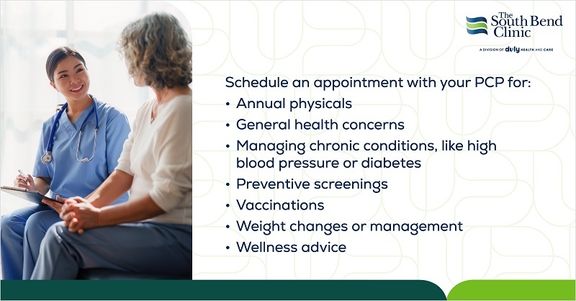If it seems like a new immediate care center pops up every day, don’t worry – you’re not imagining things. Immediate care centers (also called urgent care centers) have been around since the 1970s, but they’ve boomed in recent years. The number of centers has doubled in the last decade, and patient volume has increased by more than 60% since 2019.
Immediate care can be a lifesaver when you’re sick or injured and don’t need emergency care, but don’t want to wait for an appointment with your primary care provider (PCP). With evening and weekend hours, they are convenient if you can’t afford to take time off work or school.
At the same time, there are occasions when it’s better to see your PCP, even if it means waiting a bit longer for an appointment.
Not sure where to go? Ask yourself these questions:
Why Do I Need to See a Provider?
If you’re currently sick, you can go to either your PCP or an immediate care center. But there are certain services that are best left to your PCP.

Am I Having a Medical Emergency?
Before heading to an immediate care center, make sure that you don’t need emergency care, instead.
Choose immediate care for:
- Common illnesses and symptoms, such as cough, flu, cold, sore throat, ear infections, and sinus infections
- Digestive issues, including vomiting, diarrhea, and mild to moderate abdominal pain
- Mild asthma attacks, breathing difficulties, and bronchitis
- Minor burns, skin infections, rashes, and insect or pet bites
- Minor injuries (e.g., sprains, strains, broken bones that are not protruding through your body, or cuts that may require stitches) that do not involve severe bleeding
- Testing for the flu, RSV, and COVID-19
- Urinary tract infections, non-life-threatening allergic reactions, and mild dehydration
Also read: Knowing Where to Go for Care: The South Bend Clinic Immediate Care Centers
Get emergency care right away for:
- Anaphylaxis (a life-threatening allergic reaction)
- Back or neck injuries that cause an inability to move your head or neck, loss of bladder or bowel control, or difficulty standing
- Broken bones that poke out through your skin
- Chest pain or pressure
- Head injuries
- Injuries from a severe car accident or gunshot
- Seizures
- Severe abdominal pain
- Severe or uncontrolled bleeding
- Sudden paralysis, weakness, or severe headache
- Symptoms of shock (pale and clammy skin, gray or blue lips or fingernails, dazed or semiconscious appearance)
Also read: When to Go to Immediate Care vs. the Emergency Room
How Bad Are My Symptoms?
In many cases, it comes down to how long you’re willing to wait. Conditions like ear infections or urinary tract infections, or symptoms like a heavy cough, might not always be emergencies – but they can be painful or uncomfortable enough that they feel like one. If that’s the case, don’t wait for an appointment. You can get the comfort and relief you need much quicker at an immediate care center.
The importance of getting care right away can also make a difference. For example, up to 80% of cat bites become infected. These infections can cause fever and flu-like symptoms, and about a third of people who get treatment for a cat bite to the hand end up needing to be hospitalized. Infections can set in within a few hours. While a bite isn’t necessarily cause for a trip to the emergency room, you should get care within 8 hours – so immediate care may be your best bet.
Do I Keep Having the Same Symptoms?
Symptoms that keep coming back could be a sign that there’s an underlying problem. Immediate care providers are great at treating symptoms and detecting acute illnesses like the flu, but they don’t focus on diagnosing chronic conditions.
That’s where PCPs are the experts. They will perform more in-depth exams, order any necessary tests, and consider your medical history. Since they track your health over time, they can see patterns that could clue them in as to what’s going on.
Are My Symptoms Related to a Chronic Medical Condition?
Similarly, PCPs are more focused on treating chronic conditions than immediate care providers. Schedule an appointment with your PCP (or a specialist if you already work with one) if you suspect that your symptoms are related to:
- Arthritis
- Asthma
- Chronic or seasonal allergies
- Coronary artery disease
- Diabetes
- High blood pressure
Do I Need a Physical?
PCPs are your go-to for annual physicals. It’s critical to see your PCP every year so they can screen for medical conditions, monitor chronic conditions, give vaccines, and help you reach your health goals like weight management.
However, if your child needs a sports physical, you can stop by an immediate care center. Sports physicals are check-ups that are required yearly for young athletes in school-sponsored athletic programs. They often need to be completed by a deadline, so your child may not be able to wait for an appointment. Just make sure that they still visit a PCP. The sports physical should not take the place of a yearly check-up, since it’s usually conducted with a specific sport or activity in mind, while annual physicals may be more broad.
Do I Need Lab or Imaging Tests?
Many immediate care centers offer testing on-site so that you don’t need to go to another location or schedule an appointment through your PCP’s office.
For example, they often have:
- Lab services, including blood work and urine tests
- X‑rays
- Computed tomography (CT) scans
- Ultrasounds
Some immediate care centers only offer lab tests during certain hours, so be sure to check before you head over.
See all services offered at South Bend Clinic Immediate Care Centers.
Should I Go to Immediate Care or a Retail Clinic?
Retail clinics (clinics within stores like drugstores or grocery stores) have similar services, but they aren’t the same as immediate care centers. When you have a choice, opt for an immediate care center.
Immediate care centers, which are often affiliated with healthcare systems, can usually provide additional services or more advanced care. If the center is affiliated with a system where you already receive care, providers have easy access to your records and medical history. This can make it easier for a provider to prescribe the care that best suits your needs, especially if you have chronic conditions, regularly take medication, or have allergies.
There may be times when it’s not clear where you should go for care. You can always call your PCP’s office or an immediate care center, and they can help you choose the best place to go.
Don’t let uncertainty keep you suffering. Visit a South Bend Clinic Immediate Care Center for quick relief, or book an appointment with a primary care provider to address underlying health concerns.
Health Topics:





